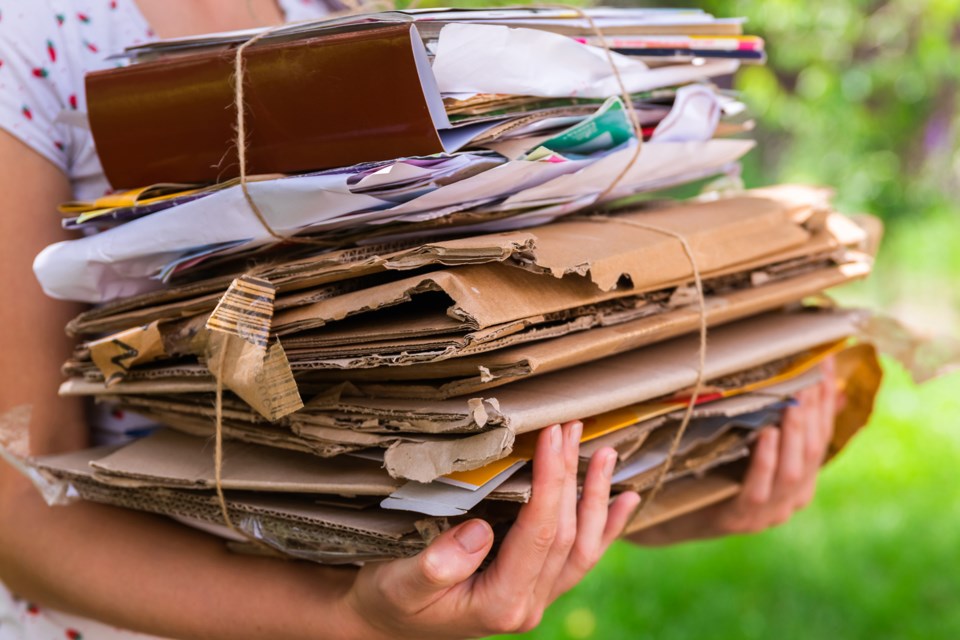DIDSBURY - At the request of council, officials from Environmental 30 Solutions Ltd. (E360) have appeared as a delegation to update council on the blue bin program the company oversees in town.
The review came at the March 28 council meeting, with E360’s Kristian Peirens, operations specialist, and Kirstin Ball, operations manager appearing.
Council passed a motion on Jan. 24 calling for the company to provide an update on the blue bin program, which sees residents place recyclable such as cardboard into bins for recycling.
“We had a lot of questions about recycling so we invited E360 to come and make a presentation,” said mayor Rhonda Hunter.
Ball explained that E360 has recently entered into a new partnership with Capital Paper in Calgary and Edmonton, a large sorting and recycling facility.
“Previously all of your recycling was being hauled to our recycling facility in Red Deer,” said Ball. “We are no longer doing that just because we are able to get more out of the recycling by going to Capital Paper. Your stuff in particular is going to Edmonton.
“So what we are doing is we pick it here, take it to our facility in Red Deer, and then it is loaded into a truck and hauled to Edmonton.”
Having Capital Paper involved has allowed a 20 to 25 per cent increase in overall diversion, “keeping mostly everything out of the landfill,” she said.
Previously Didsbury was seeing 75 to 85 per cent recycled material with 15 to 25 per cent going to landfill, she said.
“Capital Paper operates under a zero waste recycling process with industry-leading facilities in Alberta,” she said.
On average Didsbury produces about 15 to 20 tonnes of single stream recycling per month, which typically consists of 55 per cent cardboard, 25 per cent newspapers and other papers, 10 per cent tin and metal, and 15 per cent plastics, she said.
“We do acknowledge the increasing demand for plastic recycling in the local markets and we have definitely made it a priority to offer reliable and effective programs to all of our towns,” she said.
“Historic volumes of plastics have not been great enough to reliably collect, store and sell to production facilities producing consumer products. Our strategic move to Capital Paper increases the overall volume of material handled by the sorting facility, opening opportunities previously not available to our local operations.
“Production market consists of a multitude of fields including spray insulation, animal bedding, rubber/plastic pellet matting (playground use) all product collected from the municipality is reduced and reused.”
Less than 10 per cent of items currently put through the blue bin program end up in the landfill because of contamination.
Cardboard collection is currently profitable to recycle, at about $5 to $10 per a metric tonne, and plastics are also currently profitable, “which is a very positive thing,” Peirens said.
E360 recommends the town continue to operate the blue bin recycling program going forward, he said.
Ball said residents can help make the recycling system effective by following a number of steps, including breaking down all cardboard boxes, tin cans should be cleaned of all residue, plastic grade 1-7 are accepted and should also be cleaned of all residue.
As well, all recycling should to be placed in curbside bin separately and all recycling should be un-bagged and free within the bin.
Mayor Rhonda Hunter says it is encouraging that recycling remains viable through the blue bin program.
“This is a good news story,” said Hunter.
The town’s blue bin program is not related to the separate issue of recycling centres operated by Mountain View Regional Waste Commission, council heard.
Council accepted the E360 presentation as information.
Council passed a second motion instructing the strategic planning committee to look into the possible cost of having E360 conduct a forensic audit to determine exactly what is being put in the bins.
The committee would bring back a recommendation to council.
“It will give you exact information on what is being put into your blue bins,” Peirens said.



